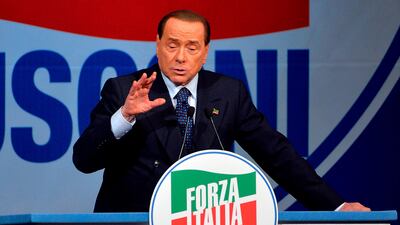Could there be a fourth act in the political life of Silvio Berlusconi? The 81-year-old Italian politician, who has already served three terms as prime minister of the country, was celebrating on Monday after a coalition of right-wing parties he had engineered swept to victory in elections in Sicily which have been widely trailed as an indicator to how the country will vote in next year’s general election.
The Berlusconi-backed candidate for regional president, Nello Musumeci, won 39.9 percent of the vote, comfortably clear of Giancarlo Cancelleri of the populist Five Star Movement (M5S), on 34.6 percent. The country's ruling Democratic Party (PD) and its coalition partners suffered from the general dissatisfaction with their rule, with the PD candidate polling just 18.5 percent. Prime minister Paolo Gentiloni's centre-left party also lost control of the regional assembly.
Celebrating a triumph that appeared highly unlikely when he was driven from office in disgrace in 2011, Mr Berlusconi said on social media that: “Sicily has chosen the road of real, serious and constructive change, based on honesty, competence and experience.”
Mr Berlusconi is on the rise again and victory in Sicily will strengthen his hand as he prepares to tie down the terms of a general election alliance with the far-right Northern League.
“This marks the start of a wonderful new chapter for the united right,” said Giovanni Toti, governor of the northern region of Liguria and a key lieutenant of the revitalised Berlusconi. Lombardy governor Roberto Maroni hailed the former premier as “immortal.”
Famous for his ‘Bunga Bunga’ sex parties, penchant for plastic surgery and serial gaffes, Berlusconi had been written off as a spent political force after a series of scandals and open heart surgery last year. He is barred from public office as a result of a conviction for tax fraud, but is hoping to have the ban lifted. Even if it is not, he will be a central figure in what promises to be a highly unpredictable election.
Fewer than half the 4.5 million eligible voters cast ballots with turnout predicted to be slightly down from other recent votes on the island where disillusionment with politicians runs deep due to the years of collusion between the political class and the mafia crime groups which have made the island notorious.
The outcome represents a significant setback for M5S, which had harboured ambitions of taking control of its first region after claiming the mayorships of Rome, Turin and a string of smaller municipalities last year. It also underlined the significant problems facing the PD as it struggles to unite Italy's divided left in time for a nationwide vote due in the first half of 2018.
Political commentator Giovannia Orsina said: “Berlusconi is still going and the right is competitive again.”
Five Star doubled its popular vote from the last round of regional elections and claimed a moral victory on the grounds that it was projected to get more votes than any other single party.
“We started a wave that can take us to 40 percent in four months time (in the national election),” said Luigi Di Maio, the party's candidate for prime minister.
The PD's regional secretary, Fausto Raciti, described the outcome as a wake-up call for the left.
“We can only recognise a clear defeat. I hope that this outcome will trigger reflection across the left on the need for unity,” he said.
As things stand, the PD will enter the general election with former premier Matteo Renzi as its candidate to lead the country.
A centrist, Renzi is loathed by many on the left of his own party and in other factions. They accuse him of adopting right-wing policies in the guise of reforms aimed at bolstering Italy's flagging competitiveness.
Renzi also carries the baggage of his defeat in a 2015 referendum on constitutional reform that led to his resignation and replacement by current premier Paolo Gentiloni.

